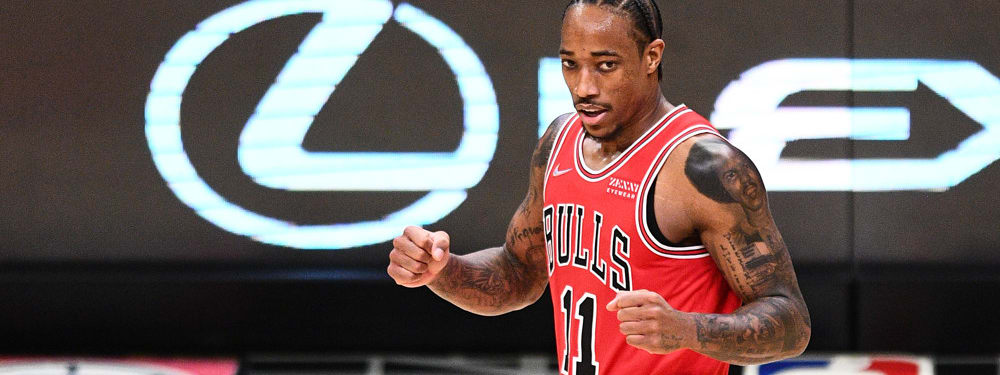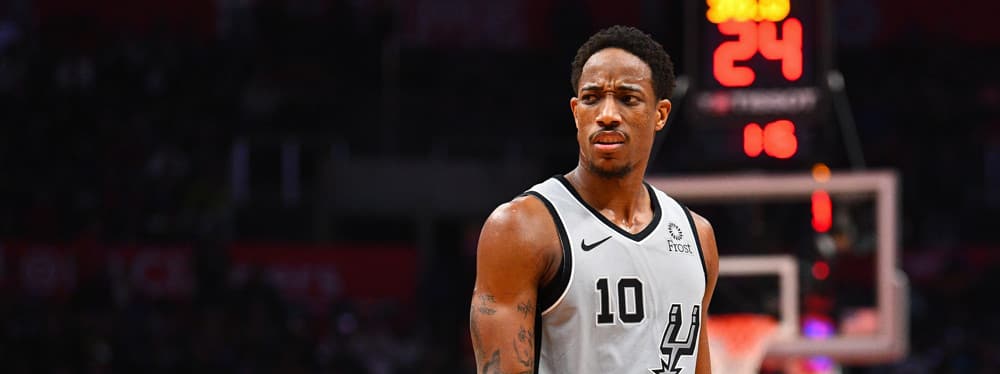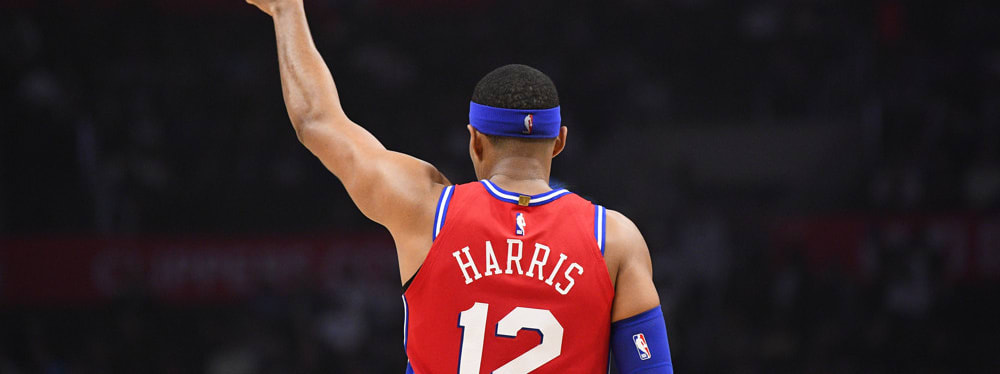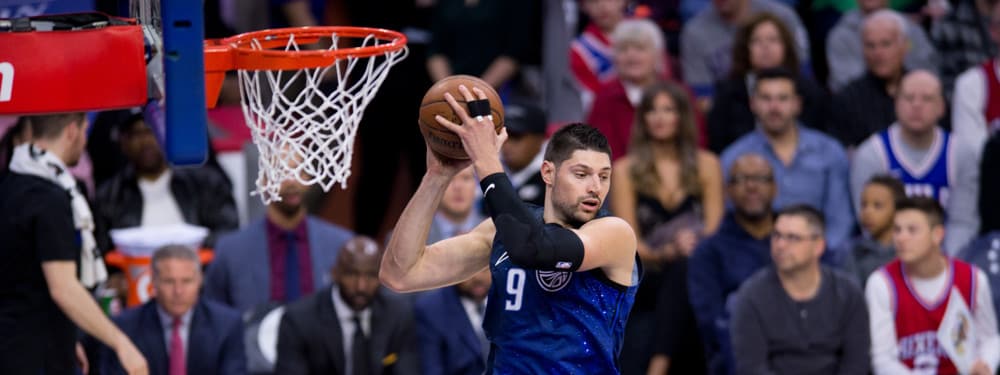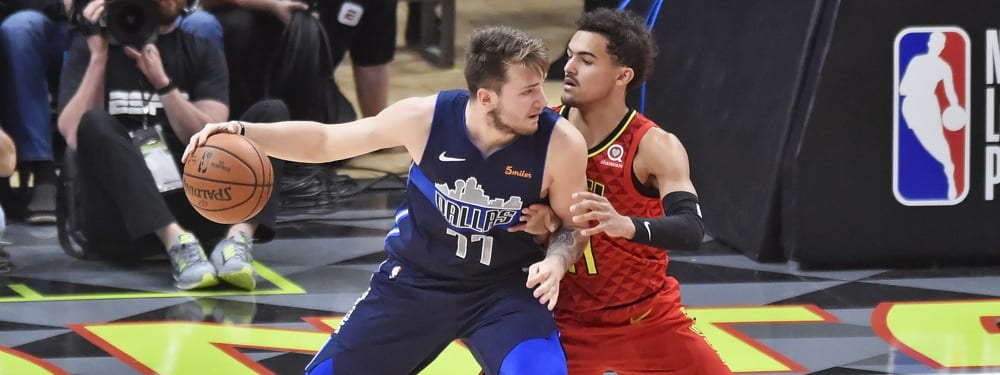Recent RotoWire Articles Featuring Al-Farouq Aminu
See More
A knee injury that cost Aminu most of the 2019-2020 campaign continued to hamper him through the start of last season, and he didn't return to game action until February. The veteran forward eventually worked his way up to a starting role with Orlando but didn't do much with the opportunity, posting per-game averages of 5.9 points, 5.9 rebounds, 1.8 assists and 1.2 steals across 24.0 minutes. A trade to Chicago in late March cratered what little fantasy value Aminu held, as he played in only five games for the Bulls and averaged under 11 minutes per contest. The Spurs acquired Aminu in the offseason, giving the former Wake Forest star a fresh start for his age-31 campaign. His role is likely to be marginal, however. Thus, Aminu shouldn't be a consideration in most fantasy drafts.
Aminu landed with the Magic on a three-year, $29 million deal after spending the last four seasons with the Trail Blazers. The forward averaged 9.4 points, 7.5 rebounds and 1.2 threes across 28.3 minutes, making 81 starts. Aminu is a solid defender and rebounder who can hit a three when needed, though he's far from a knockdown shooter. He won't start at power forward, with that spot locked up by Aaron Gordon, though Aminu could push Jonathan Isaac for the starting small forward gig. Regardless of his status as a starter, minutes in the mid-to-high 20s seem like a reasonable expectation as he could be the first man off the bench. Aminu's projected minutes and quality rebounding and defense give him a steady fantasy floor, though his upside is limited on an offense led by Gordon, Nikola Vucevic, Evan Fournier and Terrence Ross.
Aminu ended up starting 67 out of 69 games last season, averaging 9.3 points, 7.6 rebounds, 1.2 assists and 1.1 steals across a career-high 30 minutes per contest. While the 27-year-old did see a slight improvement in his three-point accuracy (36.9 percent, up from 2016-17’s 32.9 percent), his overall shooting success rate disappointingly remained under 40.0 percent for the second straight season. Aminu exceeded 47.0 percent in two straight seasons during the 2012-13 and 2013-14 campaigns, so the downturn is concerning to an extent. On the plus side, Aminu’s work on the glass was superior, with his rebounding figure checking in as the second highest of his career. Looking ahead to the coming season, Aminu projects for a similar workload, although 2017 first-round pick Caleb Swanigan could certainly push for significantly more time than the 7.0 minutes he averaged during his rookie campaign. Aminu still projects as the fourth scoring option on the Blazers’ offense, but his all-around production and relatively secure role keeps his Fantasy stock steady heading into the 2018-19 season.
A lingering calf injury was the main reason Aminu played just 61 games this past season, marking a career-low for the 26-year-old power forward. However, even when he was healthy, he wasn't at his best and started just 25 games compared to all 82 contests a year prior. His field goal and three-point percentage fell from 41.6 and 36.1 percent, respectively, to just 39.2 and 32.9. That resulted in just 8.7 points per game, which he complemented with 7.4 rebounds, 1.6 assists, 1.0 steal and 1.1 three-pointers across 29.1 minutes. Looking ahead to the 2017-18 campaign, Aminu will likely battle with Moe Harkless for rights to the starting power forward role. Harkless is currently the favorite, but he also spends a lot of time at small forward, which should allow Aminu plenty of run at the position even if he comes off the bench. Guys like Noah Vonleh and Caleb Swanigan could cut into Aminu's minutes, but a relatively similar role is likely realistic. That said, if Aminu does receive a 30-minute workload yet again, that could present a bounce-back opportunity, especially if he can become a bigger three-point threat in addition to his strengths as a rebounder and defender.
Signed to a modest four-year, $30 million contract last summer, Aminu proved to be a nice value buy for the Trail Blazers, even though his scoring was frequently volatile. Aminu was able to settle into a full-time role on the top unit in his first year in Portland, starting all 82 games and setting per-game career highs in points (10.2), assists (1.7), three-pointers (1.5) and minutes (28.5), while also offering a helpful 6.1 boards and 0.9 steals per game. After bagging only 109 total three-pointers and hitting them at a sub-30 percent clip over the first five seasons of his career, Aminu's emergence as a threat from distance was the most surprising development, as he knocked down 126 treys at a respectable 36.1 percent clip. Aminu's improved three-point shot may be a major reason why Blazers management has indicated that the 26-year-old, after serving as a small forward for most of 2015-16, will likely see most of his time at power forward during the upcoming campaign. At 6-foot-9 and 215 pounds, Aminu possesses the physique to match up with bigger power forwards, while his newly discovered shooting skills will allow the Blazers to space the floor and deploy smaller lineups with confidence. If the Blazers commit to the plan to use Aminu at power forward, he could see his rebound rate spike, since he'd be on the floor less frequently with two traditional big men.
Only five years into his career, Aminu has been traded once and tested the free-agent waters three times, including one season with the Mavericks in 2014-15. Arriving with small forward Chandler Parsons, Aminu didn't record most of his minutes at the three for the first time, instead earning an even split between small and power forward (46 percent apiece). Aminu's workload withstood wild swings throughout the campaign, with December serving as the nadir (12 minutes per game, while taking the court in 11 of 15 outings). However, Parsons' battle with ankle and knee issues after the All-Star break improved Aminu's stock, especially in April, when he averaged eight points (on 40 percent shooting), 7.9 rebounds, 1.9 assists, and 1.1 blocks in 27 minutes across eight outings. After Parsons was ruled out for the postseason prior to Game 3 of the Mavericks' first-round series versus the Rockets, Aminu put together what was likely the most stat-laden, three-game stretch of his career (15.0 points, 8.7 rebounds, 2.3 steals, 2.0 three-pointers, and 1.0 block in 36 minute per game). Upon moving on to Portland, the career 29-percent shooter from three-point range isn't a candidate to sustain such output from deep, but with no established presence at small forward, Aminu has ample opportunity to continue to contribute across the board.
Al-Farouq Aminu is entering his fifth season in the NBA after signing with Dallas in the offseason. He averaged 7.2 points, 6.2 rebounds, 1.4 assists, 1.0 steals, and 0.5 blocks in 27 minutes per game last season with the Pelicans. Aminu played in 80 games during his third and final season with New Orleans while shooting 47 percent from the field on 6.2 attempts per game and 66 percent from the free-throw line on 1.7 attempts per game. He has never lived up to the hype that surrounded him when the Clippers selected him with the eighth-overall pick. However, he's made a name for himself as a versatile defender with a knack for rebounding. Coach Rick Carlisle likes to have a defensive specialist on hand and could turn to Aminu frequently in the competitive Western Conference. He's never been a great shooter, but he won't be asked to carry much weight on offense for a deep Dallas team. At 23 years old, Aminu is still young enough to carve out a niche for himself in the league, but his game doesn't necessarily translate over to the fantasy realm well.
The Pelicans are relying on Aminu to hold down the small forward spot on a team that has playoff aspirations this year, and he appears to have the talent to not disappoint. He has seen his minutes per game average increase by roughly five minutes per game in his last two seasons, getting 27 mpg in 2012-13. If he were to see a slight bump this season, the results could be fantastic for fantasy owners, as his per-36 minutes averages from last season were 9.7 points, 10.2 rebounds and 1.6 steals. Aminu is another good dark horse candidate to lead small forwards in rebounds per game, especially since the Pelicans may be going small this year, with Anthony Davis moving to center and Ryan Anderson playing a stretch four, which would leave plenty of rebounds for the 6-9 Aminu. Other than rebounding, perhaps the biggest improvement Aminu made from his second season to his third was shooting efficiency. In 2011-12, Aminu shot 41 percent from the field on 5.5 attempts per game, but last season he made 47.5 percent of his 6.2 shots per contest. He is average-to-above average in field-goal percentage, rebounding, steals and blocks, and he is below average everywhere else, so he makes for a nice option at the back end of drafts if your team has inverse strengths and weaknesses.
Acquired last season, Aminu remains after the team decided to part ways with Quincy Pondexter. Aminu is coming off of a subpar year where he averaged 6.0 points, 4.7 rebounds and over 22 minutes a game – all higher numbers than his rookie year. Aminu played in every game last year, and earned more minutes and a slew of starts. With Anderson in town, Aminu will likely be relegated to the bench, but his familiarity of the system and a heavy rotation being used should see Aminu getting his playing time. In deeper leagues he may be valuable - if he takes a leap forward this year.
The newly-acquired Aminu enters New Orleans in a position battle with Quincy Pondexter for the backup small forward role. Aminu is coming off a productive rookie year where he averaged 5.6 points, 3.3 rebounds and over 17 minutes a game – all higher numbers in respect to Pondexter’s. Aminu also comes in more highly touted, being a top-10 pick a year ago. What Aminu has working against him is that he plays the same role as a fellow “young gun” and will be coming in without much of an offseason program with the Hornets. The likely situation will have Aminu being cycled into more athletic and smaller lineups.
Aminu is the team’s small forward of the future, but his game is too unpolished for him to be asked to play meaningful minutes in the NBA this season. We could see him earn extended minutes in the second half of the season if coach Vinny Del Negro falls out of love with Ryan Gomes and the team is struggling to contend for a playoff spot.
